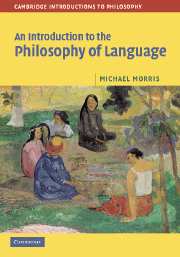Book contents
- Frontmatter
- Contents
- Acknowledgements
- Introduction
- 1 Locke and the nature of language
- 2 Frege on Sense and reference
- 3 Russell on definite descriptions
- 4 Kripke on proper names
- 5 Natural-kind terms
- 6 Quine on de re and de dicto modality
- 7 Reference and propositional attitudes
- 8 The semantics of propositional attitudes
- 9 Davidson on truth and meaning
- 10 Quine and Davidson on translation and interpretation
- 11 Quine on the indeterminacy of translation
- 12 Austin on speech acts
- 13 Grice on meaning
- 14 Kripke on the rule-following paradox
- 15 Wittgenstein on the Augustinian picture
- Glossary
- Works cited
- Index
2 - Frege on Sense and reference
Published online by Cambridge University Press: 05 June 2012
- Frontmatter
- Contents
- Acknowledgements
- Introduction
- 1 Locke and the nature of language
- 2 Frege on Sense and reference
- 3 Russell on definite descriptions
- 4 Kripke on proper names
- 5 Natural-kind terms
- 6 Quine on de re and de dicto modality
- 7 Reference and propositional attitudes
- 8 The semantics of propositional attitudes
- 9 Davidson on truth and meaning
- 10 Quine and Davidson on translation and interpretation
- 11 Quine on the indeterminacy of translation
- 12 Austin on speech acts
- 13 Grice on meaning
- 14 Kripke on the rule-following paradox
- 15 Wittgenstein on the Augustinian picture
- Glossary
- Works cited
- Index
Summary
Key text
Gottlob Frege, ‘Über Sinn und Bedeutung’, Zeitung für Philosophie und philosophische Kritik, 100 (1892), pp. 25–50; translated (for example) as ‘On Sense and Meaning’ in G. Frege, Collected Papers on Mathematics, Logic, and Philosophy, ed. B. McGuinness (Oxford: Blackwell, 1984); this paper appears in many anthologies in various translations.
Introduction
The German mathematician and philosopher, Gottlob Frege, is widely regarded as the father of analytic philosophy. His work has shaped everything which has been written in the philosophy of language in the analytic tradition. I think there are two principal reasons for this. First, his philosophy of language presents a way of accepting what seems most natural and intuitive about the kind of approach to language found in Locke, while decisively rejecting what seems most questionable about it. And, secondly, his work offers the prospect of a thoroughly systematic approach to meaning.
Frege shares with Locke these three crucial assumptions which we identified in chapter 1:
(L1) The nature of language is defined by its function;
(L2) The function of language is to communicate;
(L3) What language is meant to communicate is thought.
But his clearest disagreement with the Lockean tradition comes in his treatment of these two assumptions:
(L4) Words signify or mean the components of what language is meant to communicate;
(L5) The components of thought are Ideas.
Frege accepts some version of (L4), but understands it in a non-Lockean way. Locke had the following conception of how words are components of sentences.
Information
- Type
- Chapter
- Information
- An Introduction to the Philosophy of Language , pp. 21 - 48Publisher: Cambridge University PressPrint publication year: 2006
